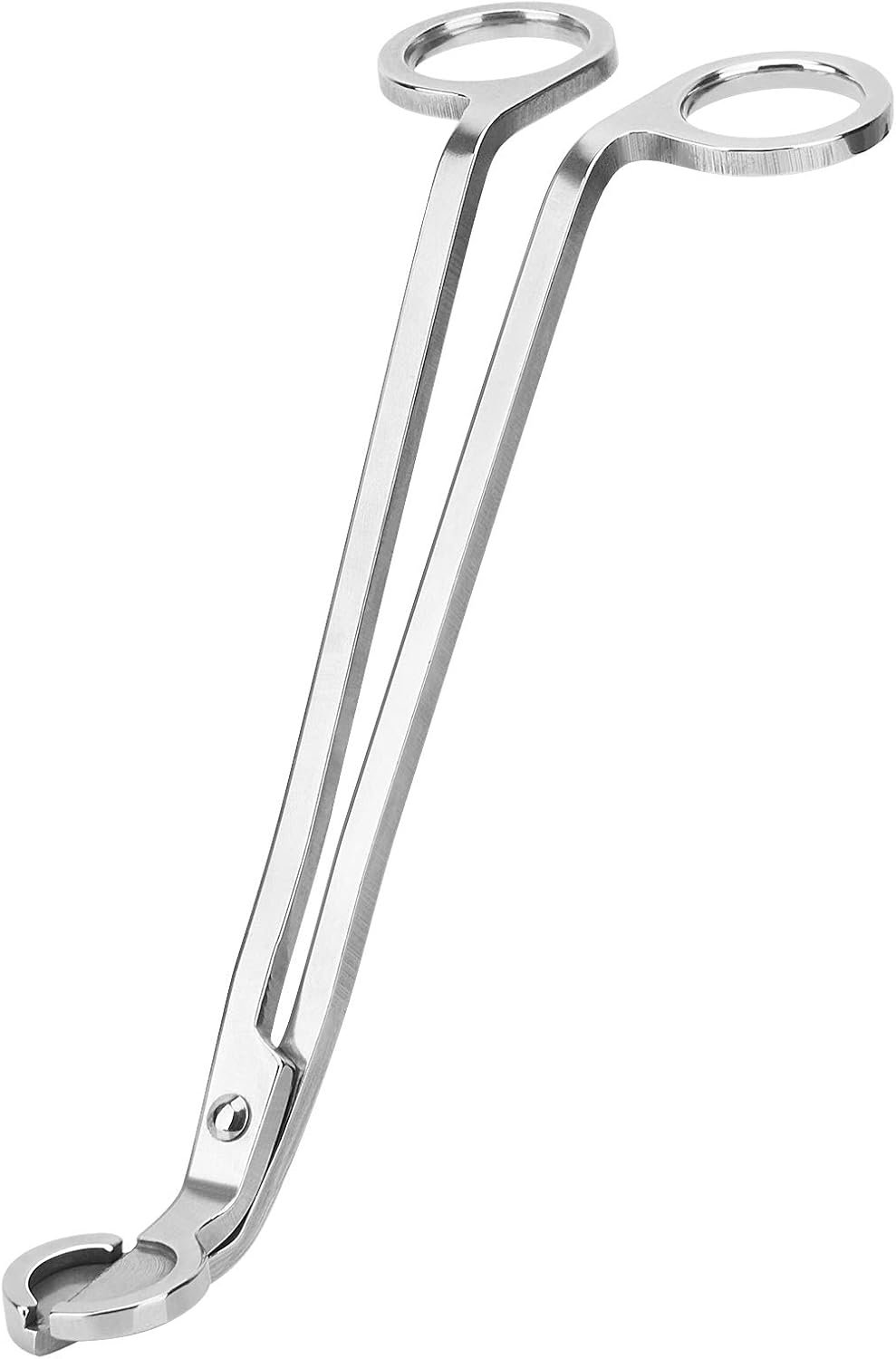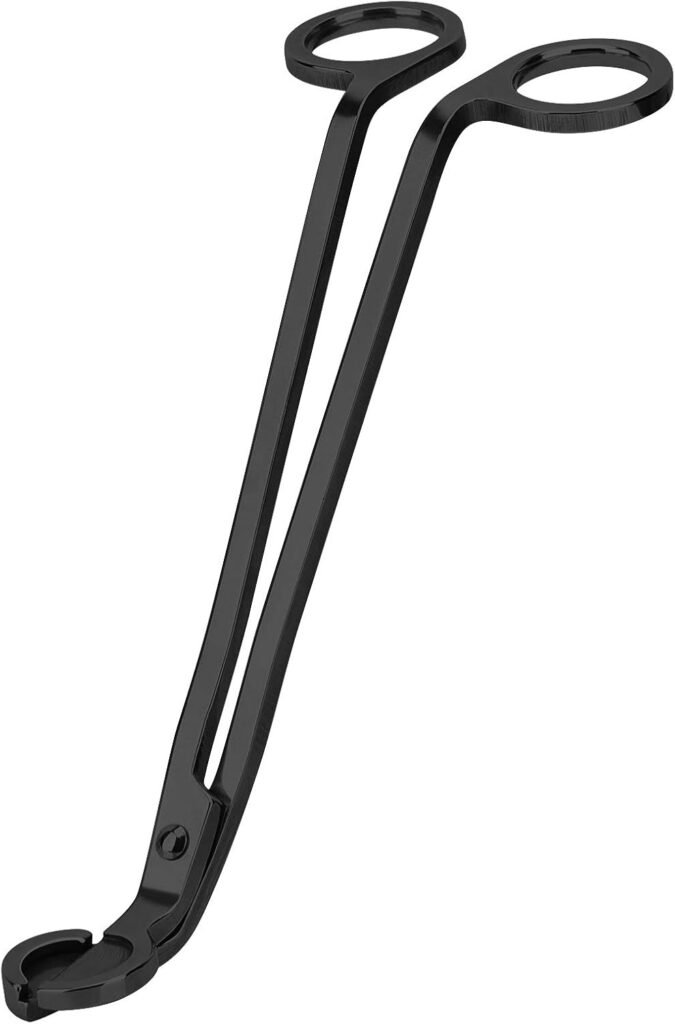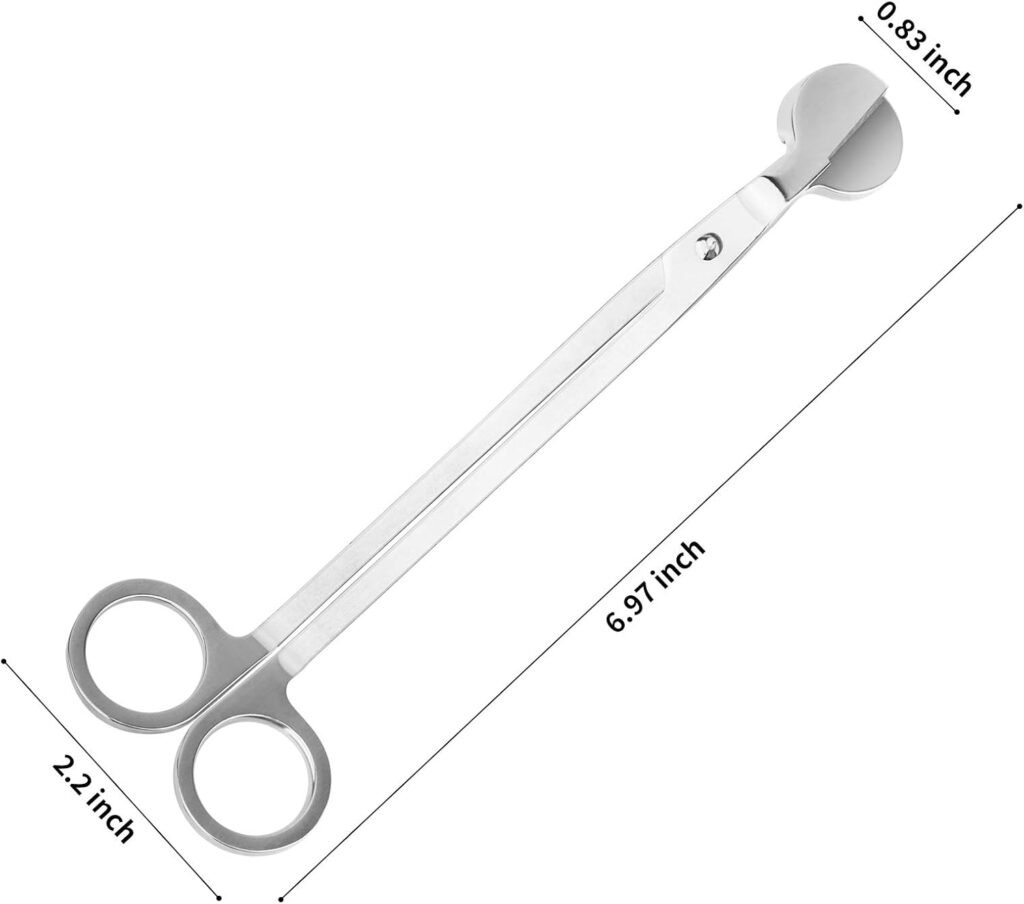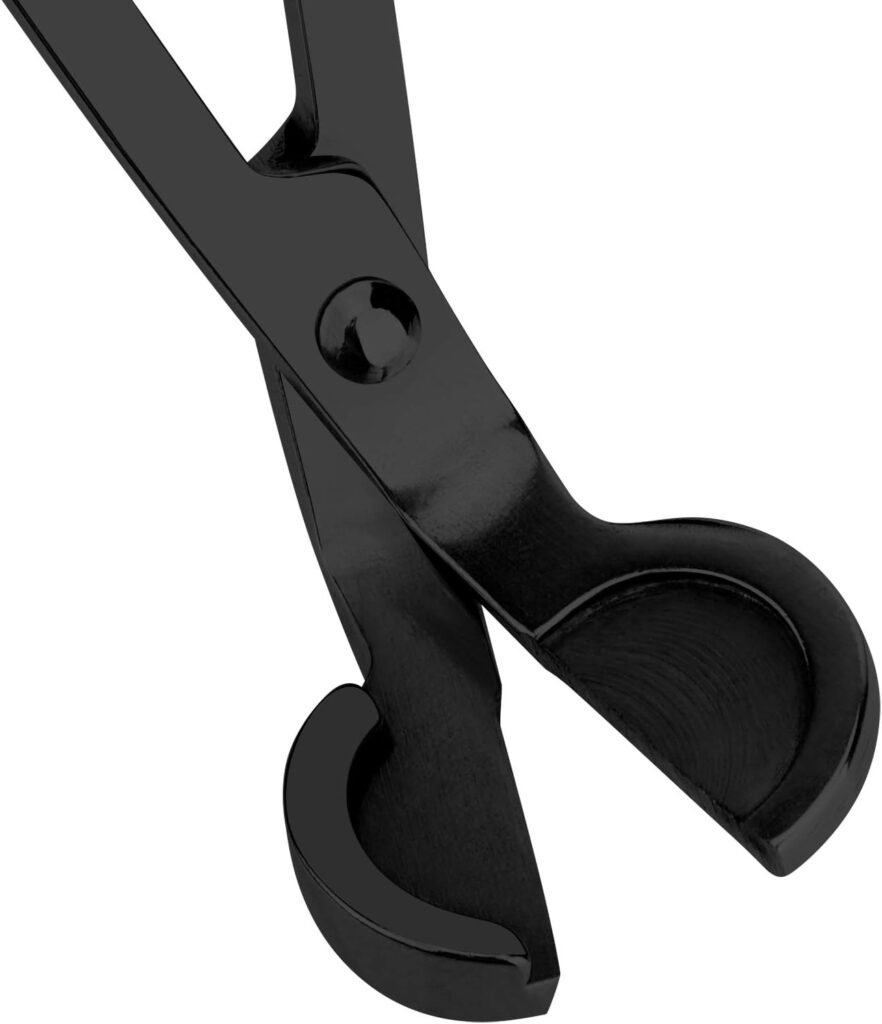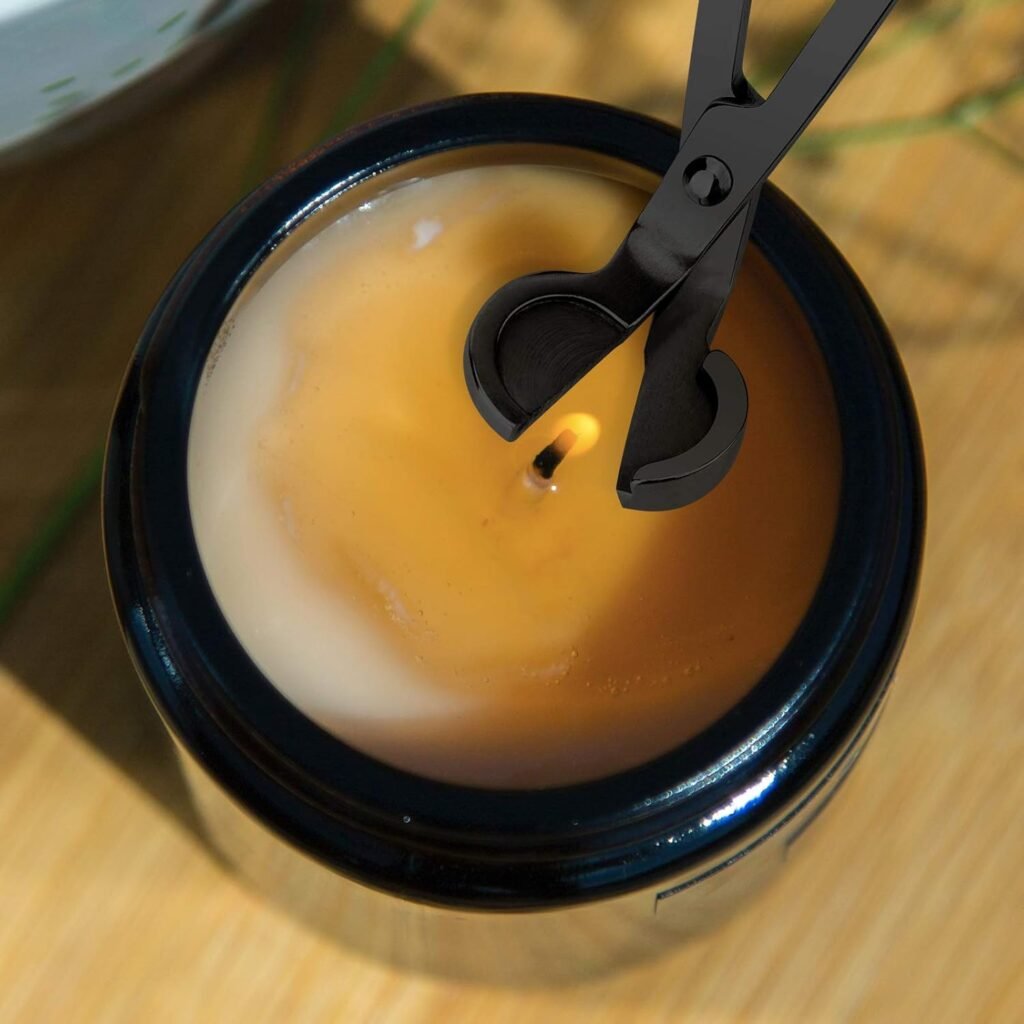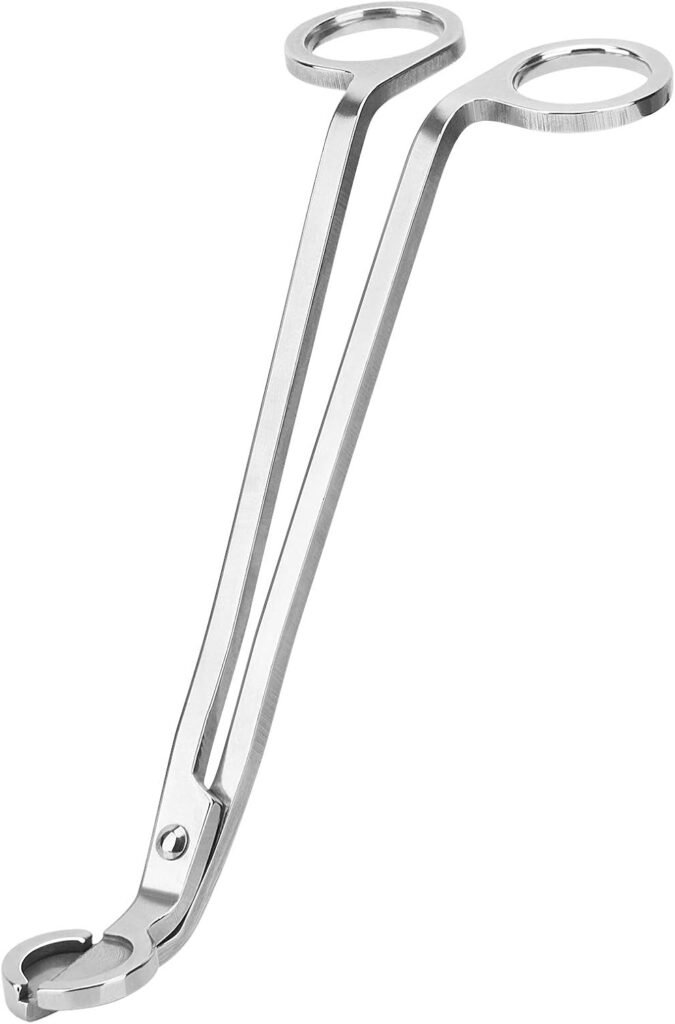Have you ever tried trimming a candle wick and wished you had a tool that made the job fast, clean, and a little bit elegant?
First Impressions
You’ll notice right away that the CHEFBEE Candle Wick Trimmer, Polished Stainless Steel Wick Clipper Cutter, Scissors, Reaches Deep Into Candles to Cut Spent Cord, Allow Cleaner Burn and Prevent Soot Buildup (Black) looks more refined than the cheap, flimsy trimmers you might have used before. The black finish gives it a modern, minimal look that fits in with most home decor while feeling substantial when you pick it up.
Packaging and first look
When you remove the trimmer from the package, you’ll appreciate that it’s presented simply and securely, with the tool itself clearly visible and protected. There’s no excessive packaging, and the trimmer arrives ready to use without any assembly, which is always satisfying when you want a quick win.
Build quality and design
The construction feels solid in your hand, and the stainless steel speaks to longevity rather than disposability. You’ll also notice the long 7″ length immediately, which is one of the most practical design features for accessing deep jar or pillar candles.
Dimensions and Materials
You want a tool that’s long enough to reach deep, yet narrow enough to fit into tight candle jars, and this trimmer balances those needs well. The combination of size and stainless steel material makes its functionality predictable and reliable.
Size of ChefBee Candle Wick Trimmer
The trimmer measures approximately 18 x 6 x 3 cm (7.09 x 2.36 x 1.18 inches), with an overall length around 7 inches. That length allows you to reach deep into most pillar candles and many jar candles without burning your fingers or leaning too close to the flame.
Stainless steel and finish
The trimmer is made of stainless steel with a polished black finish, which resists rust and holds up to regular use. You’ll like that the finish is both practical for resisting stains and stylish for leaving out on a mantel or bedside table.
Usability
You want a tool that’s intuitive, and this trimmer is designed for straightforward use so you can trim wicks quickly and safely. It’s particularly useful if you burn candles regularly and want to maintain cleaner burns and reduce soot.
How to use the trimmer
To use it, hold the handles like scissors and position the blades over the wick, then close the handles to cut. You should trim the wick to about 1/4 inch (6 mm) before each burn for optimal flame size and reduced soot; the trimmer makes achieving that consistent length easy.
Reaching deep candles
Because of the 7″ length, you can reach down into tall pillars and many jar candles without tilting or reaching dangerously near the flame. That means you can trim wicks even after candles have burned down substantially, which is a big convenience when you like to get full life from a candle.
Precise cutting and debris tray
You’ll appreciate the trimmer’s built-in debris tray that captures the trimmed wick ends, keeping your surface clean. After cutting, simply open the tray or flip the trimmer over to dump the small bits into a trash bin—no mess, no burnt fingers trying to pick tiny remnants out of candle wax.
Performance
What you really care about is whether it works reliably every time, and this trimmer delivers consistently in day-to-day use. It performs well on both thin and thicker wicks, making it a versatile tool for the candles you use most.
Cutting power and blade sharpness
The stainless steel blades are sharp enough to slice through ordinary cotton and braided wicks cleanly without crushing or ragged edges. You’ll find that even slightly thicker wicks are handled without excessive force, which preserves the trimmer and reduces hand fatigue.
Cleaning and maintenance
Cleaning is minimal—wiping the blades after use or rinsing briefly under warm water will remove soot and wax residue if needed. You should avoid abrasive cleaners to protect the finish; a soft cloth and mild soap are all you’ll normally need.
Rust resistance and longevity
Because it’s stainless steel, the trimmer resists rust and corrosion provided you dry it after washing and avoid leaving it in damp places. With basic care, you can expect it to last a long time, making it an economical accessory for your candle routine.
Safety and candle care
Trimming wicks isn’t just about aesthetics; it’s a safety habit that you’ll find improves the quality of each burn. Keeping a consistent wick length reduces the risk of high flames and uncontrolled soot.
Preventing soot and improving burn
By trimming the wick to about 1/4 inch before each burn, you’ll notice smaller, more controlled flames that produce less soot. That means your walls, mantels, and ornaments will stay cleaner, and your candle glass is less likely to blacken over time.
Candle life and scent preservation
A properly trimmed wick burns more evenly and uses wax more efficiently, so you’ll get better scent throw from each burn and more hours from each candle. You’ll also reduce the risk of tunneling and wasted wax along the sides of jars.
Aesthetic and home decor
You might leave the trimmer out on a shelf or in a drawer, and its black polished finish means it won’t look out of place in most settings. It adds a small touch of elegance without being flashy.
Color options and fit
This version comes in a polished black color, which pairs well with modern interiors or monochrome decor. If you prefer a metallic look, the stainless shine is also attractive; either way, it’s unobtrusive and visually compatible with most candle setups.
Gift potential
If you’re thinking of gifting it, the trimmer makes a practical and tasteful option for candle lovers. It’s compact, useful, and presented in a way that suggests quality—perfect for housewarmings, birthdays, or small holiday gifts.
Comparison with other wick trimmers
You’ll find many options on the market, from tiny novelty trimmers to heavy-duty professional tools, and this model hits the middle ground well. It offers more reach than small models and is more refined than disposable plastic versions.
Scissors vs. trimmers vs. wick snuffers
Traditional scissors work but lack the debris tray and reach, while snuffers extinguish flames but don’t trim wicks for a future burn. The ChefBee trimmer combines precise cutting and a collection tray, making it a two-in-one solution for trimming and cleaning up.
Price and value
Given its stainless steel construction, long reach, and practical tray, the trimmer represents a good value for the price. You’re paying for durability and convenience rather than a cheap single-use tool.
Pros and Cons
You want the positives and negatives laid out so you can decide quickly whether this is right for your routine. Below are the main advantages and considerations to keep in mind.
Pros:
- Long 7″ reach for deep jars and pillars.
- Stainless steel construction resists rust and feels durable.
- Built-in debris tray collects trimmed wick ends for easy disposal.
- Polished black finish looks elegant and fits most decor.
- Sharp blades provide a clean, precise cut for consistent wick length.
Cons:
- Slightly larger and heavier than the smallest novelty trimmers, so it’s less pocketable.
- The black finish can show fingerprints; occasional wiping is needed for aesthetic cleanliness.
- Very thick or metal-core wicks may require extra force or a more heavy-duty blade.
Table: Quick Specification Breakdown
You’ll find this table useful for scanning the key technical details and why they matter to you.
| Specification | Details | Why it matters to you |
|---|---|---|
| Material | Polished stainless steel | Durable, rust-resistant, long-lasting tool |
| Size | 18 x 6 x 3 cm (approx. 7″ length) | Reaches deep into pillar and jar candles safely |
| Color | Black (polished finish) | Blends with modern home decor |
| Cutting mechanism | Scissor-style blades with debris tray | Clean cuts and easy wick-end collection |
| Package contents | 1 x candle wick trimmer (Black) | Ready to use out of the box |
| Maintenance | Wipe clean, avoid abrasive cleaners | Simple upkeep extends tool lifespan |
| Best for | Pillar & jar candles, cotton/braided wicks | Versatile for most household candles |
Practical tips for best results
You want clear, practical advice so you don’t damage candles or the tool, and a few straightforward habits will give you better burns and longer candle life.
When to trim
Trim your wick before each burn to about 1/4 inch (6 mm). This helps control flame size and reduces soot production, which keeps your candle glass and surroundings cleaner.
How to trim safely
Always make sure the candle is cool and the wax has solidified before trimming. If you’ve just extinguished the flame, allow a short cooling period so you don’t accidentally touch hot wax or the metal.
Dealing with jar candles
When the wax pool is narrow, use the long reach to trim wicks progressively as they become exposed; you’ll avoid reaching directly into the hot wax and keep the jar clean.
Storing the trimmer
Store the trimmer in a dry place to protect the finish and avoid moisture exposure that could compromise the polished surface. A small drawer or a simple tray on a mantel works well.
Detailed usage scenarios
You’ll find the trimmer useful in different candle setups and situations; here are common scenarios and how to use it in each.
At the bedside
Trim wicks before lighting a bedtime candle so you get a gentle, controlled flame that won’t cause a strong breeze when you blow it out. You’ll sleep better knowing the burn was neat and soot-free.
During meals or gatherings
If you use candles during meals, trimming wicks beforehand prevents sudden high flames or smoke that could interfere with ambiance and scent. Guests will appreciate the steady, clean ambiance.
For decorative candlesticks and centerpieces
The trimmer’s reach is ideal for centerpieces with deeper holders or layered candle displays, so you can maintain a polished look without disassembling arrangements.
When burning scented candles
Trimming helps preserve the intended scent throw by ensuring even wax consumption and preventing excess soot that can clog fragrance emission. You’ll notice fragrances are truer and last longer.
Maintenance and care instructions
You’ll get the most life out of this tool by following a few simple care steps that protect the finish and blades.
- Wipe after use with a soft cloth to remove soot and small wax bits.
- If wax sticks, warm the trimmer gently (not in a flame) or use warm water to dissolve residue, then dry thoroughly.
- Avoid harsh chemicals or abrasive pads that might scratch the polished finish.
- Store in a dry location and occasionally oil the pivot point lightly if movement becomes stiff.
Frequently Asked Questions
You likely have a few standard questions; these answers should clear up common concerns.
Q: Can this trimmer handle thick or wooden-core wicks? A: It handles most cotton and braided wicks well; for wooden-core or very thick specialty wicks, you may need a heavier duty tool designed for harder materials.
Q: Will the black finish chip or fade? A: With normal household use and basic care, the finish should hold up. Avoid dropping it or exposing it to harsh abrasives to keep the finish intact.
Q: Is the debris tray easy to empty? A: Yes, the small tray collects cut wick pieces and empties easily into a trash bin without much fuss.
Q: Can I wash it in the dishwasher? A: Hand washing is recommended to preserve the finish and pivot; if you must dishwasher it, use a gentle cycle and dry promptly.
Troubleshooting common issues
If the tool ever feels stiff or less effective, you can usually restore it quickly with a few small checks and adjustments.
Blade alignment and stiffness
If cutting becomes uneven, check that the blades are aligned properly and the pivot is not too tight. A tiny drop of food-grade oil at the pivot can restore smooth movement.
Wax accumulation
Warm the trimmer or run it under warm water to loosen wax buildup. Scrape gently with a fingernail or soft cloth; avoid metal tools that can scratch the finish.
Dull blades
Over long-term use the blades may dull slightly. You can have them sharpened if you notice ragged cuts, or replace the tool if sharpening is not practical.
Environmental and safety considerations
You care about safety and environmental impact, and trimming wicks contributes positively by promoting cleaner burns. Cleaner burns mean less particulate matter released into your living space, which is better for indoor air quality.
Reducing indoor soot
Regular trimming minimizes soot production and the blackening that can happen on glass jars and walls. That’s a small but meaningful step toward healthier indoor air and cleaner living spaces.
Disposal of trimmed wicks
Dispose of trimmed wick pieces in a sealed bin to prevent accidental fire from still-hot embers; when in doubt, ensure that trimmed bits are cool before tossing.
Final verdict
If you’re looking for a reliable, attractive, and functional wick trimmer, the CHEFBEE Candle Wick Trimmer in polished stainless steel with a black finish is a strong choice. It’s long enough to reach deep candles, sturdy enough for routine use, and designed to keep your candle-burning experience clean and controlled.
You’ll appreciate its ease of use, the debris tray that reduces mess, and the durability of the materials. For the price and everyday convenience, it’s a worthwhile addition to your candle care toolkit—especially if you want a tidy, safer burn and better scent performance from your candles.
Disclosure: As an Amazon Associate, I earn from qualifying purchases.
